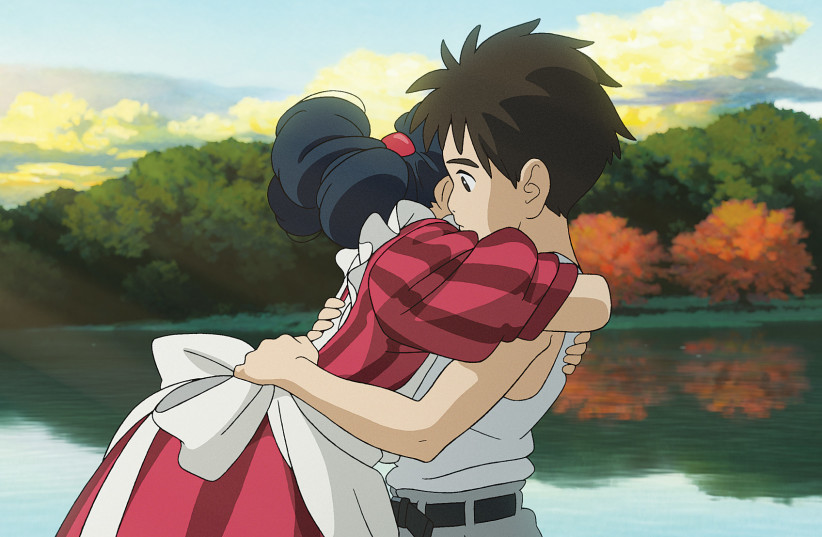A curious child who befriends a bird, an intellectual who chooses to spend his life as a cleaner, a 16th-century nobleman who seeks to unite Japan, and a peaceful village whose residents fight real-estate developers are just a few of the stories in the movies in the eighth Aki-no Festival.
The festival, which is dedicated to celebrating the best of recent Japanese cinema, will be held at the Jerusalem Cinematheque from January 23-February 3, and at the Tel Aviv Cinematheque from January 24-February 6.
Selected movies from the festival will be screened at the cinematheques in Haifa, Herzliya, Holon, and Rosh Pina.
It has been an extraordinary year for Japanese cinema, which is known for its universal appeal, and which tends to tell quiet, thoughtful stories, which could be perfect for these turbulent days.
A lineup of acclaimed Japanese directors
This year’s Aki-no Festival features movies by some of the most acclaimed Japanese directors, including Hayao Miyazaki, Hirokazu Kore-eda, and Ryosuke Hamaguchi, as well as some newcomers.
There is also the surprise that the latest movie by German director, Wim Wenders, Perfect Days, is set in Tokyo and will be included in the festival.

The festival will open with The Boy and Heron, the latest movie by the master animator, Hayao Miyazaki. Miyazaki has made such classics as Princess Mononoke and Spirited Away, and his movies combine stunning imagery with stories that feature moving journeys of self-discovery and inventive plots.
Now 82, he came out of retirement to make The Boy and the Heron, which draws on his own life. It tells the story of a boy who has to move to a village where his father builds planes for the Japanese army during World War II.
Wandering around, he encounters a heron, and together they go on a magical adventure. The movie will be opening in Israeli theaters later this month.
Wim Wenders’s Perfect Days will also have an Israeli release soon. Perfect Days, which features Japanese actors and is completely in Japanese, is Japan’s selection for consideration for the Best International Feature this year, despite its director’s nationality, and it is on the shortlist. It tells a low-key story of a cleaner who lives a solitary but fulfilling life, listening to classic rock and reading great books during his free time. Its star, Koji Yakusho, won the Best Actor Award at the Cannes Film Festival last year.
Ryosuke Hamaguchi won the Best International Film Oscar with his 2022 movie, Drive My Car, and his latest film, Evil Does Not Exist, tells the story of a girl and her elderly father who live in a small town two hours from Tokyo. They enjoy the nature that surrounds them, but when a real-estate developer wants to set up a fancy camping site there, it is a shock, and the town’s residents scramble to preserve their town.
Hirokazu Kore-eda has made such wonderful movies as Our Little Sister, Shoplifters, and After the Storm, and his new film, Monster, looks at a complex chain of events set in motion by a boy complaining to his mother about one of his teachers.
Actor/director Takeshi “Beat” Kitano’s movies generally feature fast and furious action, whether they are gangster stories or period dramas. His new film, Kubi, is a samurai saga about rivalries and political intrigues in 16th-century Japan. Viewers should be warned that it contains scenes of extreme violence.
There are a number of gentle family dramas in the festival. Two movies, Kei Chikaura’s Great Absence, and Ryutaro Ninomiya’s Dreaming In Between both deal with the pressure and sadness of coping with dementia.
Mitsuhiro Mihara’s Takano Tofu is about an elderly tofu store owner who tries to find a partner for his daughter after he becomes ill.
Daishi Matsunaga’s Egoist examines a charged relationship between two young men.
In Naoko Ogigami’s Ripples, a troubled woman joins a cult that worships water at a time when her life is in freefall.
The festival also includes a restored classic, Shinji Sômai’s 1993 film, Moving, about a girl and her mother who try to start a new life after the girl’s father leaves.
Aki-no was produced in collaboration with the Embassy of Japan in Israel.
